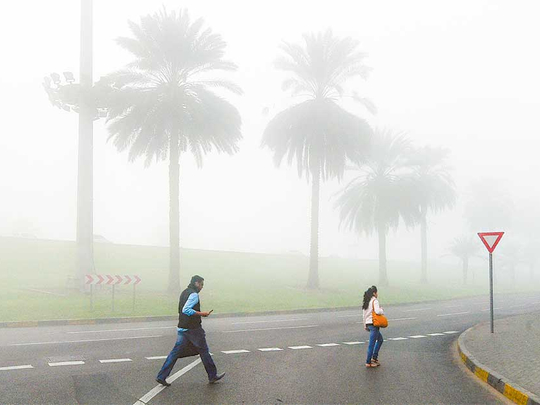
Dubai/Abu Dhabi: Rough seas, strong winds and swirling dust hit across the UAE on Saturday, lowering visibility and prompting a warning to motorists from the weather authorities.
On Saturday, sand and dust blowing across the UAE reduced visibility to around two kilometres over some areas inland, according to the National Centre of Meteorology and Seismology (NCMS).
Meteorologists warned motorists to slow down and keep a safe distance between vehicles.
Meanwhile, off the coast, rough sea conditions have seen racing wind at up to 65 kilometers per hour in the normally calm Arabian Gulf, the meteorologists said.
At the same time, wave heights reached up to 19 feet. On the UAE’s other coast, the Gulf of Oman, sea conditions ranged from “rough to very rough.”
The strong winds also brought in chilly weather. On Saturday, temperatures over costal reached highs of 21 degrees Celcius to 23 degres Celsius, and lows of 15 degrees Celcius to 17 degrees Celsius.
Further inland, temperatures reached highs of 26 degrees Celsius, and lows of 12 degrees Celsius.
Mid-afternoon on Saturday, temperatures at Abu Dhabi corniche stood at around 20.8 degrees Celsius at the Abu Dhabi Corniche, and 22.6 degrees Celcius in Al Ain.
In Dubai, temperatures went down to 15.1 degrees Celsius at the Burj Khalifa, 22.6 degrees Celcius in Ajman, 21.6 degrees Celcius in Umm Al Quwain, 22 degrees Celcius in Ras Al Khaimah, and 22.9 degrees Celcius in Fujairah. Around the same time relative humidity across the UAE was 48 per cent.
The lowest temperature in the UAE was recorded at just 4.6 degrees Celsius in the morning at Jebel Al Jais in Ras Al Khaimah, one of the country’s tallest peaks.
The morning saw fog across the UAE, which lifted by around 9am. In the mid-afternoon, parts of Dubai basked in bright sunlight, while some parts were shrouded by the swirling dust.
Shamal season
The strong winds are caused by Shamal north-western winds, that are funnelled into the Arabian Gulf from Turkey and Iraq.
These winds usually last for two to three days, and are often repeated again after a few more days.
By Sunday morning, the winds are expected to gradually subside, a forecaster from the Abu Dhabi-based centre told Gulf News by phone.
Over mid-day, the winds are expected to reduce further over both land and sea, with wind speeds slipping down to reaching to between 10 to 20 kilometres per hour. There is a chance of fog inland on both days, meteorologists added.
By Monday, temperatures are expected to have risen again, buoyed by warmer southwestern winds.










